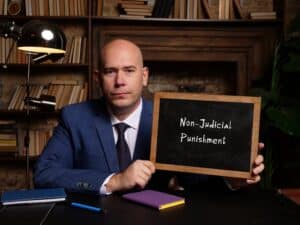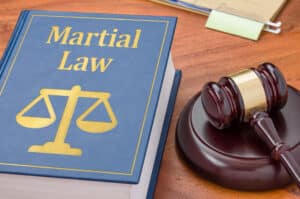If you are a military service member facing a UCMJ (Uniform Code of Military Justice) investigation or court-martial, you need an experienced UCMJ lawyer.
At Military Law, our team of skilled attorneys has decades of combined experience defending service members against various UCMJ charges, from minor disciplinary infractions to serious felony offenses.
UCMJ Lawyers Guide
- Why Choose Military Law’s UCMJ Lawyers?
- Understanding the UCMJ
- Common UCMJ Charges
- Frequently Asked Questions
- Contact Our UCMJ Attorneys at Military Law Today
Why Choose Military Law’s UCMJ Lawyers?

At Military Law, we are committed to providing our clients with the highest quality legal representation in UCMJ cases.
Here are just a few of the reasons why military service members choose our firm:
- Experience: Our team of UCMJ lawyers has decades of combined experience defending service members against a wide range of charges. We have the knowledge and skills to handle even the most complex and serious cases.
- Results: We have a proven track record of success in UCMJ cases, with a history of securing favorable outcomes for our clients, including acquittals, dismissals, and reduced charges and penalties.
- Personalized attention: We understand that every case is unique, and we take the time to get to know our clients and understand their individual needs and goals. We provide personalized attention and one-on-one support throughout the entire legal process.
- Client satisfaction: We are committed to providing our clients with the highest level of service and support, and we have a long track record of satisfied clients who have praised our professionalism, dedication, and skill.
- Free consultations: We offer free initial consultations to all potential clients. This way, you can discuss your case with an experienced UCMJ lawyer and get the information and guidance you need to make informed decisions about your legal options.
If you are a military service member facing a UCMJ investigation or court-martial, don’t wait to get the legal help you need. Contact Military Law today to schedule a free consultation with one of our experienced UCMJ lawyers. We are here to fight for you and protect your rights every step of the way.
Understanding the UCMJ
The UCMJ is a federal law governing the conduct of all members of the United States armed forces. It applies to all branches of the military, including the Army, Navy, Marine Corps, Air Force, Space Force, and Coast Guard, and covers a wide range of offenses, from minor disciplinary infractions to serious crimes like murder, sexual assault, and treason.
If you are accused of violating the UCMJ, you may face a variety of legal proceedings, including:
Article 15 (Non-Judicial Punishment)
Article 15 of the UCMJ, also known as non-judicial punishment (NJP), is a disciplinary proceeding that allows commanding officers to impose penalties on service members accused of minor offenses without the need for a formal court martial. NJP is often referred to as “Captain’s Mast” in the Navy and Coast Guard, “Office Hours” in the Marine Corps, and “Article 15” in the Army and Air Force.
The purpose of NJP is to provide a swift and efficient means of maintaining good order and discipline within a unit while also allowing service members to avoid the more serious consequences of a court-martial. Commanding officers have broad discretion to issue NJP for a wide range of minor offenses, such as being late to formation, disrespecting a superior, or violating a military regulation.
During an NJP proceeding, the accused service member has the right to present evidence and witnesses in their defense, but they do not have the right to a formal trial or to be represented by an attorney. The commanding officer will consider the evidence and determine guilt or innocence, and if the service member is found guilty, the commanding officer will impose a punishment.

The penalties NJP can impose depend on the rank of the commanding officer and the rank of the accused service member but can include:
- Reprimand or admonition
- Restriction to certain specified limits
- Extra duties
- Forfeiture of pay
- Reduction in grade (for enlisted members only)
Service members who are dissatisfied with the outcome of an NJP proceeding may appeal the decision to the next higher commanding officer. Still, the appeals process is limited and rarely results in a reversal of the original decision.
While NJP can be an effective tool for maintaining discipline within a unit, it is important for service members to understand their rights and to seek the advice of an experienced military law attorney if they are facing NJP. An attorney can help service members understand the potential consequences of NJP and advise them on the best course of action to protect their rights and interests.
Summary Court-Martial
A summary court martial is a simplified legal proceeding used to adjudicate minor offenses under the UCMJ. It is more formal than NJP but less formal than a special or general court martial.
In a summary court-martial, a single commissioned officer serves as both the judge and the jury.
The accused service member has the right to consult an attorney before the proceeding but does not have the right to representation by an attorney during the proceeding itself.
- The maximum penalties in a summary court-martial are:
- Confinement for up to 30 days
- Hard labor without confinement for up to 45 days
- Restriction to specified limits for up to 60 days
- Forfeiture of up to two-thirds of one month’s pay
- Reduction to the lowest enlisted pay grade (E-1)
One key advantage of a summary court martial over a special or general court martial is that it does not result in a federal criminal conviction. However, it is still a serious proceeding that can have significant consequences for a service member’s military career and future prospects.
Service members facing a summary court-martial should seek the advice of an experienced military law attorney as soon as possible. An attorney can help service members understand their rights and options and can work to negotiate a favorable plea bargain or to mount a strong defense at trial.
If a service member is found guilty at a summary court-martial, they have the right to appeal the decision to the next higher commanding officer. However, the appeals process is limited and rarely results in a reversal of the original decision.
It is important for service members to take summary court-martial seriously and to do everything possible to protect their rights and interests. With the help of an experienced military law attorney, service members can navigate the complex legal process and work towards the best possible outcome in their case.
Special Court-Martial
A special court martial is a formal legal proceeding used to adjudicate more serious offenses under the UCMJ than those typically handled through NJP or summary courts martial. It is more formal than a summary court martial but less formal than a general court martial.
In a special court-martial, a panel of at least three officers or enlisted members serves as the jury, and a military judge presides over the proceedings.

The accused service member has the right to representation by a military defense counsel or to hire a civilian attorney at their own expense.
- The maximum penalties that can be imposed in a special court-martial are:
- Confinement for up to one year
- Hard labor without confinement for up to three months
- Forfeiture of up to two-thirds of pay per month for up to one year
- Reduction to the lowest enlisted pay grade (E-1)
- Bad-conduct discharge (for enlisted members only)
A conviction in a special court-martial results in a federal criminal conviction that can have serious long-term consequences for a service member’s military career, civilian employment prospects, and other areas of life.
Service members facing a special court martial should seek the advice and representation of an experienced military law attorney as soon as possible. An attorney can help service members understand the charges against them, the potential penalties they may face, and the best strategies for defending against the charges.
Sometimes, an attorney may negotiate a favorable plea bargain that reduces the charges or the potential penalties. In other cases, an attorney may advise the service member to take the case to trial and mount a vigorous defense.
Regardless of the specific strategy, service members must have experienced legal counsel throughout the special court-martial process. An attorney can ensure that the service member’s rights are protected, that the prosecution is held to its burden of proof, and that the service member has the best possible chance of obtaining a favorable outcome.
If a service member is convicted at a special court-martial, they have the right to appeal the decision to the appropriate Court of Criminal Appeals. An experienced military law attorney can assist with the appeals process and work to overturn the conviction or reduce the sentence.
General Court-Martial
A general court-martial is the most serious type of court-martial under the UCMJ, reserved for the most serious offenses such as murder, rape, desertion, and other crimes that carry the potential for lengthy prison sentences or even the death penalty.
In a general court-martial, a panel of at least five members serves as the jury, and a military judge presides over the proceedings. The accused service member has the right to be represented by a military defense counsel or to hire a civilian attorney at their own expense.
The maximum penalties that a general court-martial can impose are:
- Confinement for life (with or without the possibility of parole)
- Death (for certain offenses)
- Dishonorable discharge (for enlisted members)
- Dismissal (for officers)
- Forfeiture of all pay and allowances
- Reduction to the lowest enlisted pay grade (E-1)
A conviction in a general court-martial results in a federal criminal conviction that can have severe and lasting consequences for a service member’s life, including difficulty finding employment, loss of voting rights, and other collateral consequences.
Service members facing a general court martial should seek the immediate assistance of an experienced military law attorney.
An attorney can help service members understand the seriousness of the charges against them, the potential penalties they may face, and the best strategies for defending against the charges.
An attorney may advise the service member to take the case to trial and mount a vigorous defense. This may involve challenging the admissibility of evidence, cross-examining prosecution witnesses, and presenting evidence and witnesses supporting the defense.
In other cases, an attorney may be able to negotiate a favorable plea bargain that reduces the charges or potential penalties. However, given the serious nature of the offenses typically charged in a general court martial, plea bargains may be more difficult to obtain than in other types of court martial.
If a service member is convicted at a general court-martial, they have the right to appeal the decision to the appropriate Court of Criminal Appeals and ultimately to the Court of Appeals for the Armed Forces or the United States Supreme Court.
An experienced military law attorney can assist with the appeals process and work to overturn the conviction or reduce the sentence.
Common UCMJ Charges
The UCMJ can charge many offenses, ranging from minor disciplinary infractions to serious felony crimes. Some of the most common UCMJ charges include:
Article 86 (Absence Without Leave)
Also known as AWOL, this charge applies to service members absent from their unit or place of duty without proper authorization.
Article 92 (Failure to Obey Order or Regulation)
This charge applies to service members who fail to follow a lawful order or regulation, either willfully or through neglect.
Article 120 (Sexual Assault)
This charge applies to a wide range of sexual offenses, from unwanted touching to rape, and carries severe penalties including prison time and dishonorable discharge.
Article 112a (Wrongful Use, Possession, etc. of Controlled Substances)
This charge applies to service members who use, possess, distribute, or manufacture illegal drugs and can result in significant penalties like confinement and dishonorable discharge.
Article 128 (Assault)
This charge applies to service members who attempt or threaten violence against another person and can range from simple assault to aggravated assault with a deadly weapon.
Article 134 (General Article)
This catch-all article applies to a wide range of offenses not specifically listed in the UCMJ but considered prejudicial to good order and discipline or discrediting to the armed forces.
Frequently Asked Questions
Q: Do I have the right to an attorney in a UCMJ case?
A: Yes, you have the right to an attorney in a UCMJ case. You may accept a military defense counsel or choose to hire a civilian UCMJ lawyer to represent you.
Q: How can a UCMJ lawyer help me?
A: An experienced UCMJ lawyer can support you in many ways, including investigating the charges against you, protecting your rights, negotiating with prosecutors, representing you at trial, and guiding you through the complex military justice system.
Q: How much does it cost to hire a UCMJ lawyer?
A: The cost of hiring a UCMJ lawyer can vary depending on the specific lawyer and the complexity of your case. Many UCMJ lawyers offer free initial consultations to discuss your case and provide you with information about their fees and payment options. Generally, the cost of not hiring a lawyer will exceed the cost of paying for one.
Contact Our UCMJ Attorneys at Military Law Today

Jeremy Snyder, UCMJ Lawyer
If you have additional questions or need legal assistance with a UCMJ case, contact Military Law today at (800) 235-3645 for your free consultation with one of our experienced UCMJ lawyers. We are here to protect your rights and defend your interests.
